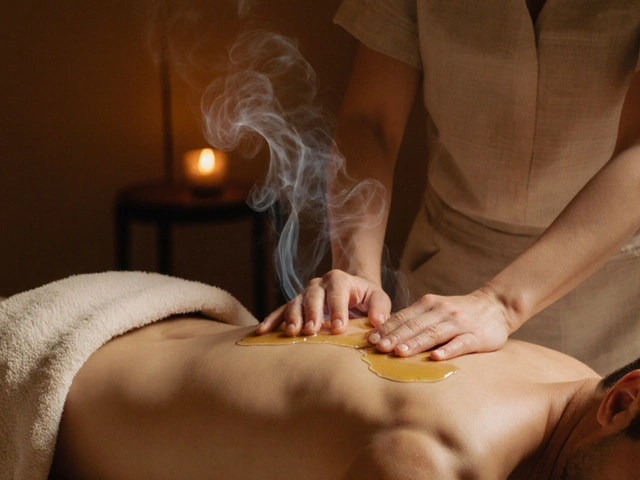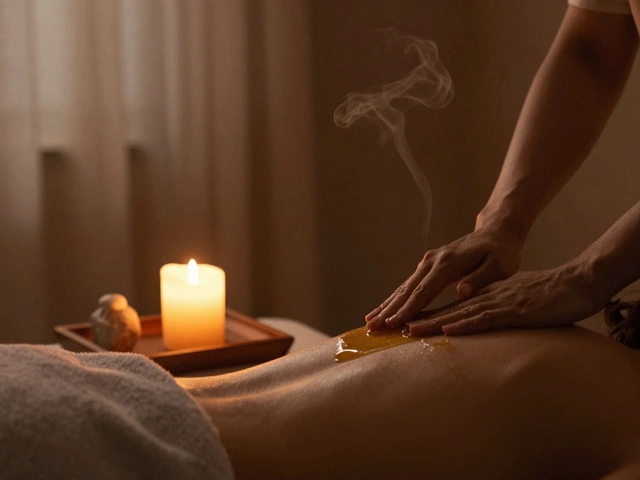If you're struggling to deal with stress, relationship bumps, or just feeling out of sync with your own body, you're not alone. Everyone wants a quick fix, but sometimes what you really need is a new approach. Yoni massage is getting more popular for a reason – it's not just about relaxation. This practice goes deeper, helping you reset both your mind and body, all through intentional, respectful touch.
Think of yoni massage as hitting a mental and physical reset button. It's not your average massage. While some folks book it hoping for stress relief, others say it helps them unpack old emotions, reconnect with their body, and feel a stronger sense of confidence. It's also getting attention among therapists who support trauma healing and growth – sometimes one session feels like weeks’ worth of self-care.
But it's totally normal to have questions. What actually happens in a yoni massage session? How do you know it's safe and worth your money? Curious about the real benefits, or how it's different from other types of massage? You're in the right place. This guide sorts out myths from facts, breaks it down step-by-step, and gives you everything you need to know if you want to try it out for yourself.
- Quick Facts and Key Benefits
- What Is Yoni Massage?
- How Yoni Massage Boosts Resilience
- Getting Ready for Your First Session
- Safety, Pricing, and Finding a Trusted Therapist
Quick Facts and Key Benefits
Let’s cut to the chase: if you’re thinking about yoni massage, it’s smart to know what you’re getting into. Here’s a rundown of the essentials, so you can decide if it fits your needs.
- A yoni massage focuses on the female pelvic area, aiming to support emotional and physical wellbeing—not just pleasure.
- Sessions usually last 60 to 120 minutes, with some therapists spending extra time on relaxation and aftercare.
- Certified practitioners follow codes of ethics and prioritize consent throughout each session.
- This practice isn’t new; it has roots in ancient Eastern traditions, but it’s now used around the world for self-care and healing.
Wondering about the real-life benefits? Here are a few that people talk about the most:
- Yoni massage can help release built-up tension, reduce anxiety, and even out mood swings by triggering the body’s natural relaxation response.
- Some people see an improvement in their relationship with their own bodies—feeling more at ease and confident.
- Studies published in 2023 found that women who received focused pelvic massage reported less physical discomfort and better sleep during stressful periods.
- It’s a tool for trauma release. Many therapists use yoni massage as part of holistic trauma support because it can create a real sense of safety and connection.
- Regular sessions may support a healthier libido and improved pelvic floor function—think better bladder control and less pain during intimacy.
Still unsure if it’s popular? Check out this quick overview of its mainstreaming since 2018:
| Year | Google Searches (Global, Annual) | Practitioner Listings (worldwide) |
|---|---|---|
| 2018 | 280,000 | 800 |
| 2021 | 450,000 | 1,700 |
| 2024 | 780,000 | 3,200 |
Quick tip: Always ask your therapist about their training and approach—it’s your body, and you have every right to know who you’re trusting it with. And if you’re not sure yet, you’re definitely not alone. More people are searching, asking, and trying yoni massage every year.
What Is Yoni Massage?
Yoni massage is a focused form of therapeutic touch that centers on the vulva area, but it goes way beyond what you'd get in a typical spa session. The word “yoni” comes from Sanskrit and it means the female genitals, but in this context, it’s not just about anatomy. It’s about connection, healing, and tuning into your body. This isn’t a new trend either. Yoni massage is part of ancient Tantric and Taoist traditions, and people have been turning to these practices for centuries to improve self-awareness, emotional balance, and physical wellness.
The main goal here isn’t just to relax or pamper yourself, but to help you reconnect with your own sensations, de-stress, and release physical or emotional tension that might be stored in the pelvic area. For some, it’s also a chance to explore and communicate boundaries in a respectful, safe setting. Therapists trained in yoni massage use a mix of light touch, slow strokes, and sometimes guided breathing or imagery to help people relax and feel present in their bodies.
This isn’t the same as a medical or clinical treatment; think of it as part of an extended self-care or bodywork routine. While sexual healing and pleasure can be side effects, the main focus is often building emotional resilience, confidence, and body literacy. The session’s pace is set by you, and you’re in control the whole time. A professional yoni massage therapist will always check in about comfort levels and never rush you through the experience.
Check out this table for a quick rundown of what typically happens versus common misconceptions:
| What Yoni Massage Is | What Yoni Massage Is NOT |
|---|---|
| Consent-led touch focused on the vulva area | A sexual service or escort experience |
| Promotes body awareness and emotional healing | A fix for medical issues or health conditions |
| Involves guided breathing, mindfulness, and safe boundaries | Pushy, goal-focused, or involving pressure to perform |
| You set the pace and everything is discussed beforehand | Something that happens without your say-so or feedback |
A lot of folks are surprised to learn just how structured these sessions can be, with plenty of time first for talking and building trust. Whether you're looking to unwind, manage past trauma, or just get back in sync with your own feelings, yoni massage offers a unique toolkit for self-care and resilience.

How Yoni Massage Boosts Resilience
Imagine you’re always running on empty — stressed, disconnected, or wrestling with old emotional baggage. That’s where yoni massage steps in. This practice does more than just help you unwind; it can boost both your emotional and physical resilience in concrete ways.
First off, yoni massage isn’t just about touch. It helps reset your body’s stress response. When you relax deeply, your nervous system switches gears, moving from fight-or-flight to rest-and-digest. This can drop your heart rate, lower your blood pressure, and help you breathe easier. There’s even research showing massage therapy can decrease levels of cortisol (your body’s main stress hormone).
On the emotional side, yoni massage is about connection — with yourself, your history, and your feelings. Sometimes emotions you’ve stuffed down for years come bubbling up, but here’s the cool part: releasing stored tension and feelings in a safe space can actually make you less “reactive” to stress in your daily life. Over time, your ability to bounce back — that’s resilience — gets a real upgrade.
Here’s how it works for most people:
- You become more aware of your body’s signals. That means you spot burnout before it knocks you flat.
- You get used to feeling safe and relaxed — not just tense and armored up. This makes your recovery from day-to-day stress so much quicker.
- Many folks report better boundaries after a session. Experiencing safe, respectful touch helps you know what you want (and don’t want) in other areas of life.
- There’s a ripple effect — you sleep better, you might feel more comfortable with your partner, and you start handling emotional ups and downs with more ease.
You don’t just have to take my word for it. Therapists and bodywork professionals have noticed that regular sessions can help with everything from painful periods to low self-esteem. For some, one session helps shed years of self-criticism or numbness.
The real power comes from the mix of physical release, emotional awareness, and feeling accepted just as you are. Add these up, and you’re left with a body and mind that can handle way more — whether it’s work deadlines, family drama, or just the everyday grind.
Getting Ready for Your First Session
First-timer jitters about your yoni massage session are totally normal. Some people worry they have to know special breathing or body techniques—nope. You just need a bit of prep and a clear idea of what’s about to happen. Here’s how to go in feeling as comfortable as possible.
Start by picking the right therapist. Make sure they’re professional with legit experience in yoni massage—look for real reviews, check their credentials, and confirm you’ll have a safe, private setting. A good therapist will happily answer all your questions up front and go over consent forms with you—don’t skip this part.
Shower before your appointment. Light, comfortable clothes are best, even better if they’re easy to remove. Skip caffeine and big meals a couple hours before session time, since a calm stomach means you’ll relax faster.
Here’s what you’ll want to bring or remember for your yoni massage appointment:
- Photo ID—some clinics require this for safety
- Water bottle—you’ll want to hydrate afterward
- Any allergies or nut oils to mention before they use massage products
- A list of questions or concerns—it’s totally okay to ask them before you start!
People often ask how long a session lasts. Most yoni massage sessions run between 90 and 120 minutes (see the table for average stats). This gives plenty of time for explaining the boundaries, checking in about comfort, and making adjustments.
| Session Length | Average Price (USD) | Typical Time Spent Relaxing |
|---|---|---|
| 60 minutes | $100-$170 | 30-40 mins |
| 90 minutes | $150-$250 | 50-70 mins |
| 120 minutes | $200-$350 | 80-100 mins |
You don't need to shave, wax, or prep your body in any special way unless that makes you personally feel comfortable. Therapists are trained for all body types, shapes, and backgrounds. Communication is key. If anything feels off, say so right away.
A little nervousness is fine. It actually means you’re doing something out of your comfort zone—which is where growth happens. After your first session, most people find they feel lighter and even more curious for next time. You might want to jot down what you liked or didn’t, especially if you plan to make this part of your routine.

Safety, Pricing, and Finding a Trusted Therapist
Before you book your first yoni massage, you’ll want to know how to do it safely, how much it really costs, and how to spot a legit therapist. It pays to be picky—after all, this is an intimate experience and you want it to feel right from the start.
Safety First: What Matters Most
- Check credentials. Your therapist should have formal massage or bodywork certifications. Many advertise special training in women’s holistic therapy or trauma-informed practice—don’t be shy about asking.
- Ask about boundaries up front. A trustworthy therapist will explain what’s involved, check your comfort level, and ask for consent at every step.
- The setting should feel private, clean, and secure. If something feels off, trust your gut and walk away.
- Plenty of therapists have clear rules, respect confidentiality, and have reviews or testimonials you can check online.
If you’re new to this, bring a list of your questions or requests. The right pro won’t hesitate to answer—or will even encourage you to chat before booking.
Pricing: What’s Normal?
The cost of yoni massage varies depending on where you live, the therapist’s experience, and session length. In most cities, you’ll pay between $120 and $250 for a 60- to 90-minute session. High-end wellness centers may charge a little more, but you should always know the price up front—no sneaky fees or awkward surprises.
| City | Average Price (USD per session) |
|---|---|
| New York | $180 - $250 |
| Los Angeles | $150 - $220 |
| Austin | $130 - $200 |
| Miami | $140 - $210 |
| Seattle | $150 - $230 |
Some therapists also offer sliding scale pricing, discounts for packages, or free phone consults to see if you’re a good fit. Don’t be afraid to ask about payment plans, especially if you’re making wellness a regular habit.
Finding Someone You Trust
- Start with a Google search for "yoni massage" plus your city. Review Google Maps listings and spa directories. Look for therapists with lots of positive recent reviews. Check if they have detailed bios and photos.
- Ask friends or women’s wellness groups online for recommendations. Many find the most trusted therapists this way.
- Once you’ve found a candidate, set up a quick phone call. Notice how they handle your questions—someone honest will encourage open discussion and never pressure you to decide.
Red Flags to Watch For:
- No credentials, or dodgy explanations about their training.
- Vague about boundaries or rushing you to book.
- No clear info about session structure or pricing.
- Unprofessional communication or lack of transparency.
Ultimately, your comfort and trust are worth more than anything. Investing a bit of time into research means you’re more likely to get the supportive, respectful experience you deserve.








